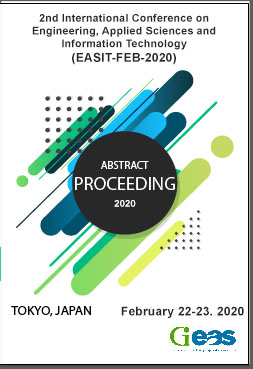
EASIT Proceedings
EASIT Proceeding
Volume 2, Pages 1-70
2nd International Conference on “Engineering, Applied Sciences and Information Technology” (EASIT 2020)
February 22-23, 2020 Tokyo, Japan
Edited by Dr. Ahmed Saddam
Track: Social Science & Humanities
Discussion on the Professional Function of the Agent of Creative Design Industry from the Perspective of Cultural Capital: Take Taiwan’s Interior Design Industry as an Example
Pages 1-12
Yi-Hsien Ho
Abstract
In 1997, Ccreative Industries Mapping Documents was published in the UK, defining the creative industries as “the potential to create wealth and employment oppor-tunities through the generation and development of intellectual property by the creativity, skills and talents of individuals”. Since then, the creative industry has become a trend in the world, is considered to be a feasible way of economic development, can drive the commercial value of other industries, and further produce considerable economic and social benefits. For a long time, because the creative industry brokers do not have professional quality, no functional standards, the government has not given the legal status of brokers, resulting in many brokers narrow vision, lack of practical experience, lack of professional ability, in the interests of the temptation, leaving a lot of negative evaluation in the market, not only can’t help the client to con-tact high-end pro-jects, It also leads to the loss of de-signer trust and market development, in general, the lack of cultural capital to support the creative broker needs the professional ability. This paper tries to explore the relationship with the function of creative industry agent from the perspective of cultural capital, and analyzes the professional functions of creative industry agents from the perspective of literature analysis, interview survey and questionnaire, and summarizes the structure of PRINCIPAL. can provide reference for future research related to creative industry agents.
Tolerance in Democracy: The Conflict between Wahabis and Aswaja in
Indonesia
Pages 13-17
Chairun Nisak Cut Lusi, Rohmah Tuthi’ Mazidatur
Abstract
Students’ Attitude as an Indicator of Students’ Readiness in Learning English Based on Blended Learning
Pages 18-23
Insantri Aulia, Ciptaningrum, Dyah, Setyowati
Abstract
EFL Teachers’ Perceived Benefits and Challenges of Task-based Language Teaching (TBLT) Implementation in Improving Students’ Speaking Skills in Indonesia
Pages 18-23
Saragih, Novilda Angela, Ashadi, Ed.D
Abstract
Developing English Material with Virtual Field Trip: The Role of WebQuest
Pages 30-39
Johara Indrawati, Dyah Setyowati Ciptaningrum
Abstract
Track: Business Management & Economic Studies
Analysis of Article 4 Indonesian Halal Act in International Trade System (Juridical and Economic Aspect)
Pages 40-47
Rohmah Tuthi’ Mazidatur, Chairun Nisak Cut Lusi
Abstract
Study on the Evaluation of Liquid Fertilizer from Agricultural Wastes
Pages 48-53
CHEN, LIH-FU, ZHENG , JUN-ZHONG
Abstract
Minimum Wage Policy and Regional Productivity in Japan
Pages 54-61
Mawatari, Shigehiro, Goto, Mika
Abstract
Track: Engineering & Technology Studies
A New Instance Generator for Scheduling Problems with Unequal-Stage and Unequal-Parallel Machine Options
Pages 62-70
Jakkrit Latthawanichphan, Watchara Songserm, Teeradej Wuttipornpun
